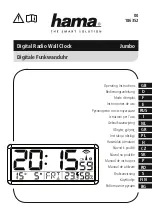Reviews:
No comments
Related manuals for Frank 2 IN-16

Jumbo
Brand: Hama Pages: 40

World Clock 2
Brand: KABTRONICS Pages: 57

Opalys 7
Brand: Bodet Pages: 36

IRONMAN 50-LAP
Brand: Timex Pages: 24

RAR186
Brand: Oregon Scientific Pages: 15

CSMP162 - AM/FM Dual Alarm Clock/Radio
Brand: Coby Pages: 1

RPW3008
Brand: Explore Scientific Pages: 84

CR626USB
Brand: Salora Pages: 12

RAC 201 PLL
Brand: Hyundai Pages: 28

V-D2425B
Brand: Valcom Pages: 12

SCD2000
Brand: SOUNDMASTER Pages: 19

CR45365
Brand: Craig Pages: 7

SICLOCK TC100
Brand: Siemens Pages: 124

SL-D800BT
Brand: Teac Pages: 68

Ortus DAB Charge
Brand: Roberts Pages: 2

Studebaker SB2101
Brand: Studebaker Pages: 1

Fischer 1610GU-45
Brand: Ambient Weather Pages: 5

Lotus WC-1994
Brand: Amana Pages: 2

















